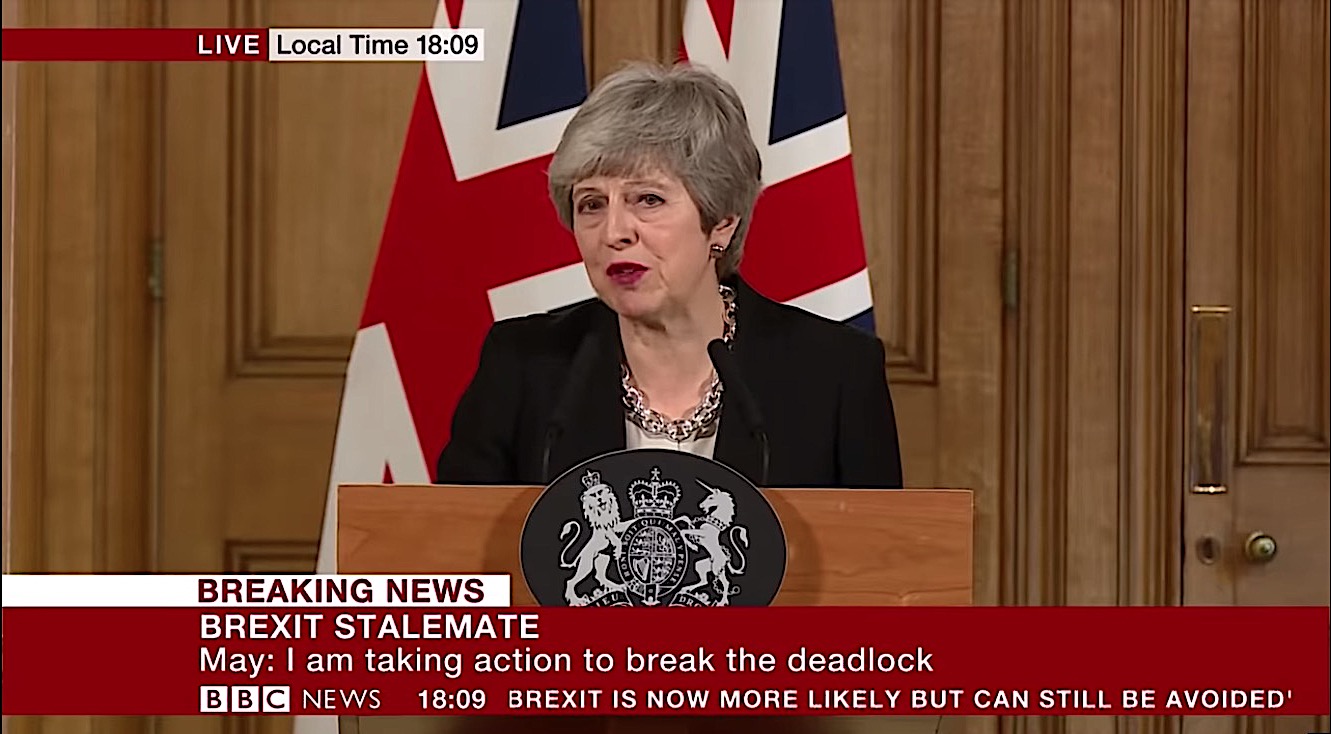Will bipartisanship save Theresa May's Brexit deal?


A free daily email with the biggest news stories of the day – and the best features from TheWeek.com
You are now subscribed
Your newsletter sign-up was successful
European officials are conspicuously preparing for a chaotic no-deal divorce from Britain next week, Britain's Parliament is hopelessly deadlocked on a Brexit plan to avert a no-deal debacle, and on Tuesday, British Prime Minister Theresa May tried a new tactic: Bipartisanship.
In a televised statement after seven hours of Brexit talks with her Cabinet, May said she would ask the European Union for another short Brexit delay so she could "sit down with the leader of the opposition and to try to agree a plan — that we would both stick to — to ensure that we leave the European Union and that we do so with a deal." She said any deal reached with Labour leader Jeremy Corbyn would have to include the exit deal she negotiated with the EU — and which Parliament rejected for a third time on Friday — but Britain's post-Brexit relationship with the EU was up for negotiation.
May's outreach to Corbyn enraged hardline Brexit supporters in May's Conservative Party, but Brexit Secretary Stephen Barclay insisted Wednesday that May had to "seek votes from the opposition benches because 35 of my own colleagues would not support the prime minister's deal." A soft Brexit "is undesirable," he told BBC News, "but it's the remorseless logic of the numbers of the House of Commons."
The Week
Escape your echo chamber. Get the facts behind the news, plus analysis from multiple perspectives.

Sign up for The Week's Free Newsletters
From our morning news briefing to a weekly Good News Newsletter, get the best of The Week delivered directly to your inbox.
From our morning news briefing to a weekly Good News Newsletter, get the best of The Week delivered directly to your inbox.
In other words, May "tried delivering Brexit with Tory votes — Tory Brexiteers said 'No,'" explained BBC political editor Laura Kuenssberg. "Now she's going to try to deliver Brexit with Labour votes. In a way, it is as simple as that." Corbyn said he learned of May's outreach via TV but was "very happy" to meet with her and recognized his responsibility to keep Britain from "crashing out" of the EU. Labour wants a customs union with the EU, worker and environmental protections, and no hard border between Ireland and Northern Ireland.
It's not clear when or even if May and Corbyn will meet, but Brexiteers are warning her outreach will split apart the Tories, who have been ambling toward a schism over Europe for 30 years.
A free daily email with the biggest news stories of the day – and the best features from TheWeek.com
Peter has worked as a news and culture writer and editor at The Week since the site's launch in 2008. He covers politics, world affairs, religion and cultural currents. His journalism career began as a copy editor at a financial newswire and has included editorial positions at The New York Times Magazine, Facts on File, and Oregon State University.
-
 Sepsis ‘breakthrough’: the world’s first targeted treatment?
Sepsis ‘breakthrough’: the world’s first targeted treatment?The Explainer New drug could reverse effects of sepsis, rather than trying to treat infection with antibiotics
-
 James Van Der Beek obituary: fresh-faced Dawson’s Creek star
James Van Der Beek obituary: fresh-faced Dawson’s Creek starIn The Spotlight Van Der Beek fronted one of the most successful teen dramas of the 90s – but his Dawson fame proved a double-edged sword
-
 Is Andrew’s arrest the end for the monarchy?
Is Andrew’s arrest the end for the monarchy?Today's Big Question The King has distanced the Royal Family from his disgraced brother but a ‘fit of revolutionary disgust’ could still wipe them out
-
 ‘One Battle After Another’ wins Critics Choice honors
‘One Battle After Another’ wins Critics Choice honorsSpeed Read Paul Thomas Anderson’s latest film, which stars Leonardo DiCaprio, won best picture at the 31st Critics Choice Awards
-
 Son arrested over killing of Rob and Michele Reiner
Son arrested over killing of Rob and Michele ReinerSpeed Read Nick, the 32-year-old son of Hollywood director Rob Reiner, has been booked for the murder of his parents
-
 Rob Reiner, wife dead in ‘apparent homicide’
Rob Reiner, wife dead in ‘apparent homicide’speed read The Reiners, found in their Los Angeles home, ‘had injuries consistent with being stabbed’
-
 Hungary’s Krasznahorkai wins Nobel for literature
Hungary’s Krasznahorkai wins Nobel for literatureSpeed Read László Krasznahorkai is the author of acclaimed novels like ‘The Melancholy of Resistance’ and ‘Satantango’
-
 Primatologist Jane Goodall dies at 91
Primatologist Jane Goodall dies at 91Speed Read She rose to fame following her groundbreaking field research with chimpanzees
-
 Florida erases rainbow crosswalk at Pulse nightclub
Florida erases rainbow crosswalk at Pulse nightclubSpeed Read The colorful crosswalk was outside the former LGBTQ nightclub where 49 people were killed in a 2016 shooting
-
 Trump says Smithsonian too focused on slavery's ills
Trump says Smithsonian too focused on slavery's illsSpeed Read The president would prefer the museum to highlight 'success,' 'brightness' and 'the future'
-
 Trump to host Kennedy Honors for Kiss, Stallone
Trump to host Kennedy Honors for Kiss, StalloneSpeed Read Actor Sylvester Stallone and the glam-rock band Kiss were among those named as this year's inductees
